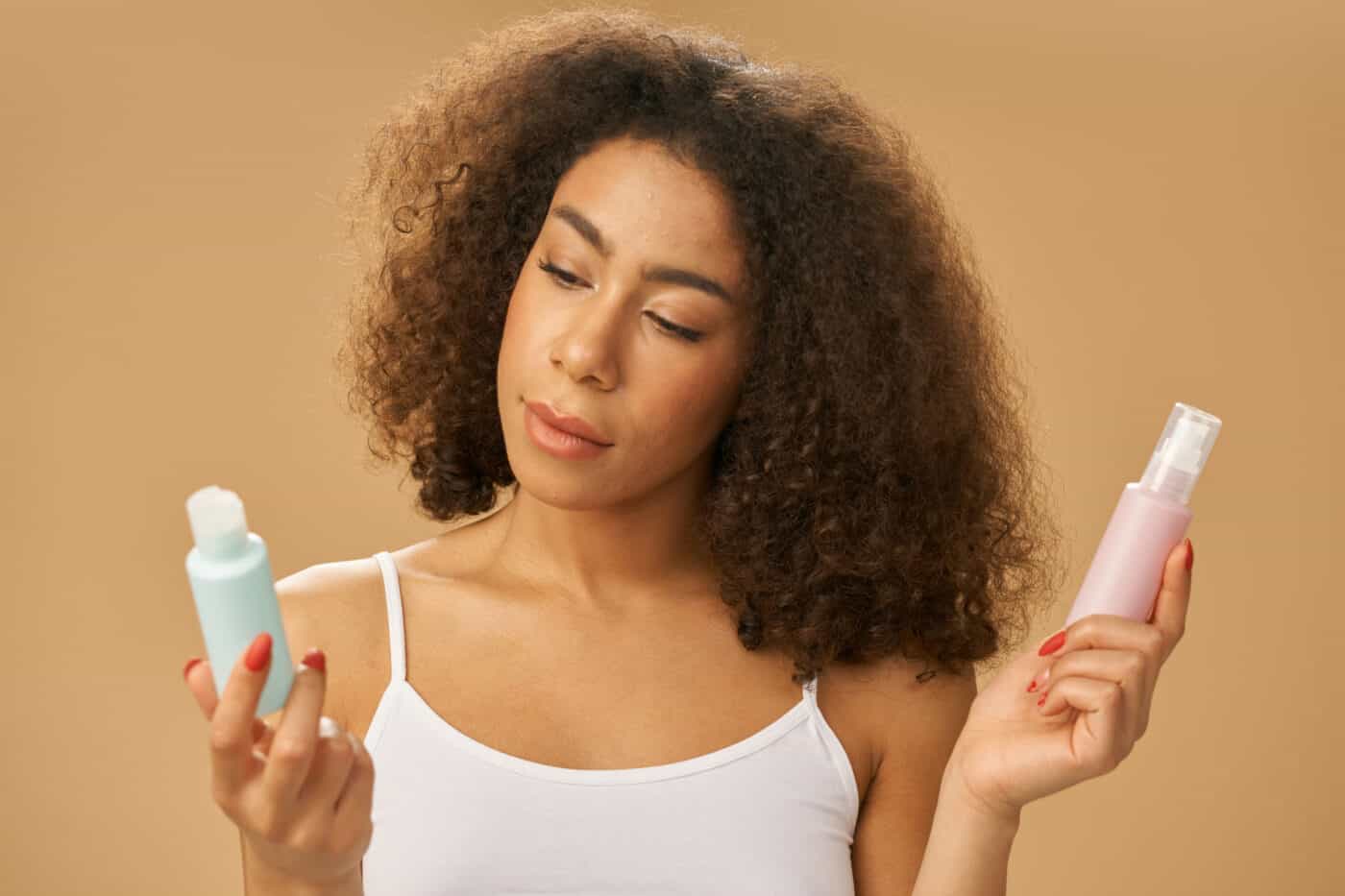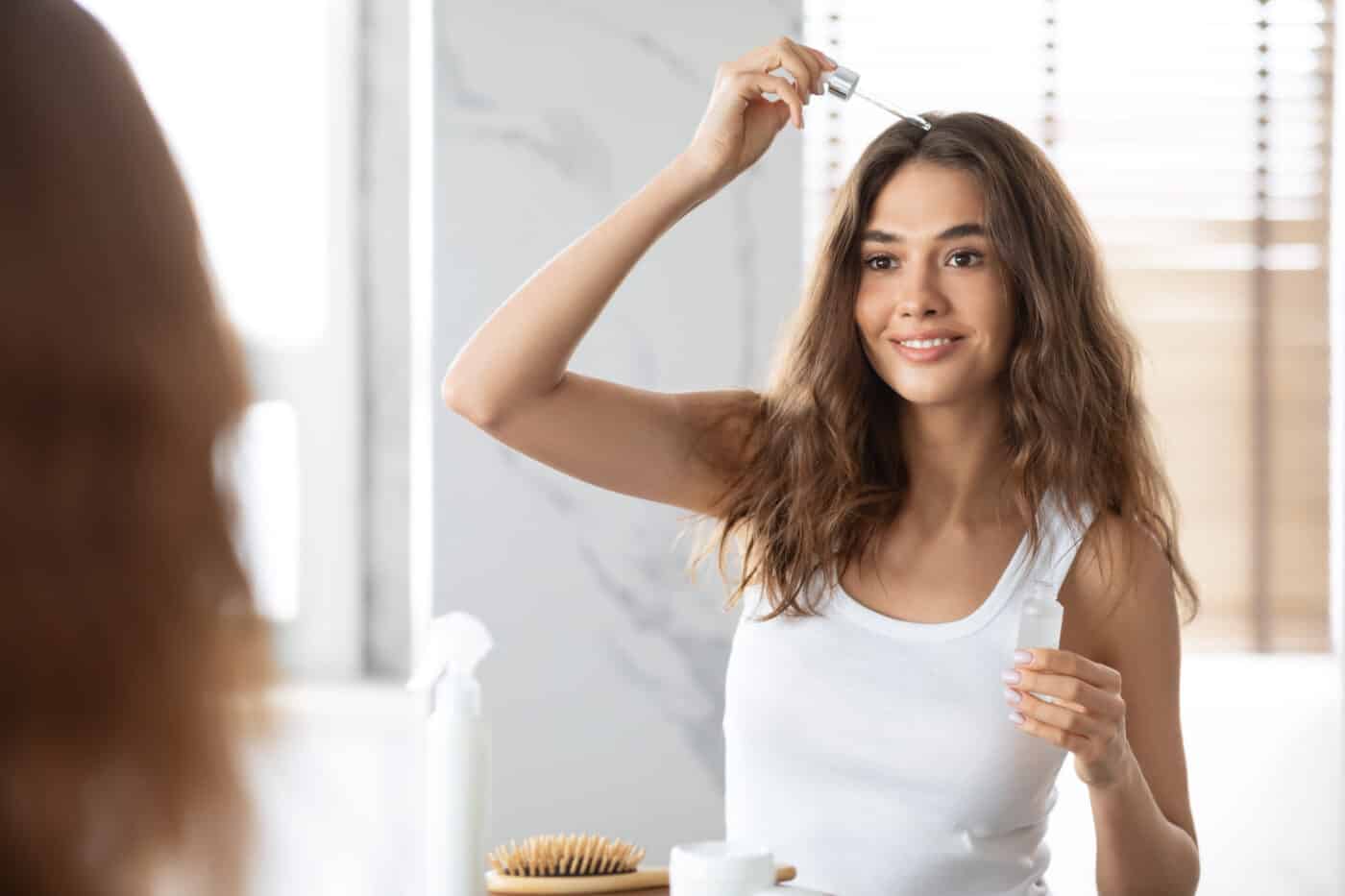Hair serums are a great option if you are looking to improve your hair health. To avoid harmful chemicals, I recommend making your own natural hair serums at home. Read on for my top five DIY recipes!

5 Best Natural Hair Serums You Can Make at Home

As you now know, of the numerous types of hair serums you can purchase at the store, most of them have harmful chemicals that you do not want to put in your hair.
Making your own hair serum means you know exactly what is going to the product and feel confident that you are doing right by your hair.
While there is no shortage of recipes out there, we have done the research for you and created a list of the five best homemade hair serums that are both easy to make and great for your hair.
Here’s a list of the serums:
- Jojoba Oil Serum
- Aloe Vera Gel Serum
- Herb Oil Serum
- Coconut Oil Serum
- Vitamin E Serum
Let’s go through each recipe so that you can decide which one is best for your hair.
1. Jojoba Oil Serum
Before we discuss the ingredients for this recipe, it’s important to understand what jojoba oil is and what it can do for your hair.
Jojoba oil is made from the seeds of the jojoba shrub which is native to the North American deserts.
It contains antioxidants, vitamins, and anti-inflammatories which are great for both hair and skin.
The difference between jojoba and other oils is that jojoba is actually technically a wax ester, or a fatty acid, that can do wonders for moisturizing while still being lightweight enough to not weigh your hair down.
Let’s find out how to make jojoba oil serum yourself.
Ingredients
- Jojoba oil – 2 tablespoons.
- Peppermint essential oil – 5 drops.
Instructions
Mix the two ingredients together in a small jar and you have an incredible hair serum at your fingertips that smells delicious. To use it, simply apply a teaspoon’s amount to slightly damp hair.
Jojoba oil serum is great for curly or wavy hair as it is light enough to allow your hair to keep its natural bounce.
2. Aloe Vera Gel Serum
Aloe vera is nature’s moisturizer. The gel can be found directly in the leaves of the plant that looks similar to a cactus with arms.
If you don’t happen to have an aloe vera plant in your garden, you can easily purchase it at a health store, but make sure to check the ingredients to ensure aloe vera is the only one.
For this recipe, you will also need rose water and a fatty oil such as almond oil, coconut oil, or avocado oil, which can be found in the same wellness section of the store.
Ingredients
- Small jar
- Rose water
- Aloe vera
- Oil (coconut, almond, or avocado)
- water
Instructions
- Use a small spray bottle or jar.
- Add 4-5 tablespoons of rose water.
- Add 1 tablespoon of pure aloe vera.
- Add just a bit of almond oil, coconut oil, or avocado oil.
- Add 1-2 tablespoons of water.
- Mix well.
It’s important to note that it will only last for about 10-15 days before starting to change its texture.
Luckily, if you just keep the ingredients on hand, you can make a half batch or whatever amount you need to get you through the two-week time period as often as you like.
Aloe vera gel serum should be used by applying a small amount to the ends of your hair, not the roots, after a shower when the hair is damp, and you will have smooth and silky hair in no time.
3. Herb Oil Serum
Oils made from herbs are some of the best possible natural products for your homemade hair serum.
While most oils will moisturize your hair, we have a recipe that will turn your locks from lackluster to luscious in no time at all.
Ingredients
- Avocado oil – 4 tablespoons.
- Jojoba oil – 2 tablespoons.
- Almond oil – 2 tablespoons.
- Argan oil – 2 tablespoons.
- Grapeseed oil – 2 tablespoons.
Use a little less than a teaspoon of the serum on the ends of your your hair when it is still damp before styling.
Remember, while most oils do work well for hair serums, not all varieties are interchangeable. If you do not have one of these oils on hand, make sure you research what a good replacement oil might be.
4. Coconut Oil Serum
Coconut oil may just be the most popular natural oil available today. People use it to cook, bake, brush their teeth, on their face, and of course, in their hair.
Coconut oil has a plethora of nutrients and moisturizing benefits for your hair, skin, and even for the body itself.
The good news is, that means that you may just have some coconut oil laying around, but if you don’t, it can be found in almost every grocery store.
You can actually use plain coconut oil on your hair as a serum when it’s damp, but using this recipe will enhance the oil’s natural remedies and make your hair silky smooth.
Ingredients
- Coconut oil – 2 tablespoons.
- Argan oil – 2 tablespoons.
- Buckthorn oil – 1 teaspoon.
- 5 drops of your essential oil of choice.
Instructions
Once the oils are mixed, just add a few drops to towel dried hair. Avoiding the scalp can ensure the hair does not get greasy. However, as coconut oil can also prevent dandruff, you can use it on the scalp as a mask, but you will need to wash your hair again after.
5. Vitamin E Oil
You may already know that scalp health is incredibly important when it comes to healthy and beautiful hair. Vitamin E can increase the strength of your hair by reducing the oxidative stress on your scalp and protecting the skin.
Many oils such as almond, sunflower, and grapeseed all have a significant amount of vitamin E, however, if you can find it either in an oil or capsule form in your health food store, of course, it will be even more concentrated and therefore, more potent.
Here’s how to make the best vitamin E oil hair serum at home:
Ingredients
- Vitamin E Oil – 1 teaspoon.
- Rose Essential Oil – 10 drops.
- Aloe Vera Gel – 10 tablespoons.
- Coconut Oil – 2 tablespoons.
- Rose Water – 2 tablespoons.
Instructions
While you can add just a few drops to the ends of your hair after washing to ease any frizz, the best way to use it is to apply the serum generously on the hair and scalp at night before going to bed.
When you wake up, shower and wash your hair normally for the best results.
Final Thoughts

When it comes to making your hair feel and look as healthy and beautiful as possible, natural hair serums are absolutely the way to go.
Luckily, you now have the five best recipes so you can choose your favorite and start loving your hair again.
Just remember, serums made of natural oils are great for the hair, but you don’t want to overdo it. If you find that you have used too much serum, don’t worry. Just wash it out as you would a mask and style your hair as you normally would.
Frequently Asked Questions (FAQ)
As you now know, most oils are great for hair. However, there are a few to avoid: raw mineral oil, lemon oil, and camphor oil can damage your hair.
You can and should use a natural hair serum when it’s damp after being washed. But remember, it is only recommended to wash your hair once or twice a week to keep the natural oils intact.
Well, it really depends on the oil. Some oils such as rosemary, rosehip, and lavender have vitamins that can be beneficial for your hair. But usually, they are just added for their delicious smells.
The truth is that only the chemicals in store-bought serums can damage your hair. So if you are following a natural serum recipe, your hair is not in any danger.
References
https://www.prevention.com/beauty/a29829814/jojoba-oil-benefits/
Disclaimer: This site is not intended to provide professional or medical advice. All of the content on LovedByCurls.com is for informational purposes only. All advice should be followed at your own discretion. Ingredients may change at any time so always check the product label before using. Check our full disclaimer policy here.
